
Euros set to push women’s football forward again


Euros set to push women’s football forward again
The Salvation Army is a Christian church and registered charity seeking to share the good news of Jesus and nurture committed followers of him. We also serve people without discrimination, care for creation and seek justice and reconciliation. We offer practical support and services in more than 700 centres throughout the UK. Go to salvationarmy.org.uk/find-a-church to find your nearest centre.
The Salvation Army first published a newspaper called the War Cry in London in December 1879, and we have continued to appear every week since then. Our name refers to our battle for people’s hearts and souls as we promote the positive impact of the Christian faith and The Salvation Army’s fight for greater social justice.
Editor: Andrew Stone, Major
Deputy Editor: Philip Halcrow
Staff Writer: Emily Bright
Staff Writer: Claire Brine
Staff Writer: Ewan Hall
Editorial Assistant: Linda McTurk
Graphic Designer: Mark Knight
Graphic Designer: Natalie Adkins
Email: warcry@salvationarmy.org.uk
The Salvation Army United Kingdom and Ireland Territory 1 Champion Park London SE5 8FJ
Tel: 0845 634 0101
Subscriptions: 01933 445445 (option 1, option 1) or email: subscriptions@satcol.org
Founders: William and Catherine Booth
International leaders: General Lyndon Buckingham and Commissioner Bronwyn Buckingham
Territorial leaders: Commissioners Jenine and Paul Main
Editor-in-Chief: Major Julian Watchorn
Published weekly by The Salvation Army
© The Salvation Army United Kingdom and Ireland Territory ISSN 0043-0226
The Salvation Army Trust is a registered charity. The charity number in England, Wales and Northern Ireland is 214779, in Scotland SC009359 and in the Republic of Ireland CHY6399. Printed by CKN Print, Northampton, on sustainably sourced paper
Your local Salvation Army centre
Speaking to the War Cry three years ago as the Uefa Women’s Euro 2022 was about to get under way in England, BBC commentator Vicki Sparks predicted that the tournament was ‘coming at a perfect time’ to build on the growth of the women’s game and would ‘smash’ attendance records. She was right. And when Chloe Kelly scored England’s winner in the final, the excitement went up another gear.
In an interview in this week’s issue, footballer and digital content creator Charlotte Lynch reflects: ‘With England’s win came more demand for the game. Now a lot more women and girls are either returning to the game or starting to play.’
Charlotte hopes that the Women’s Euro 2025 will give the game ‘another big push’. And while the matches are being screened on BBC and ITV platforms, younger viewers may also find themselves discovering the joys of football in a new CBeebies comedy, Football Fantastics, in which Charlotte appears.
‘It follows six kids – girls and boys – who come together every weekend and play for their local football group,’ she says. ‘They’re creating friendships, they’re going on adventures and they’re learning life lessons.’
Charlotte herself appreciates how football has given her ‘lifelong friendships’. She also values some life lessons from beyond football that have helped her navigate highs and lows in the game.
She says that when she had a serious injury that took her out of the game for months, she relied on her Christian faith, which assured her that her identity was not based on football. ‘God has a plan for my life,’ she says. ‘I have realised that, aside from football, I’m still a human being, I’m still valuable.’
Charlotte’s analysis of what matters in life links up with the experience of countless other people going through a variety of circumstances. Their stories are a weekly fixture in the pages of the War Cry
Every day around the world, people come to a deeper realisation – or discover for the first time – that God values them. Whenever they do, they find that it’s a game changer.
When you’ve read the War Cry, why not pass it on ➔ ➔ ➔
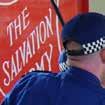




Feature by Claire Brine
It’s time to get thinking about drinking. Alcohol Awareness Week – which begins on Monday (7 July) – encourages people to consider the role that booze plays in their life and offers advice for anyone who wants to cut down on their intake.
According to Alcohol Change UK, which co-ordinates the week, 10 million people are regularly drinking in such a way that causes harm to their health and wellbeing. One person in the UK dies every hour as a result of alcohol. And in this year’s campaign, the charity is particularly asking people to consider the links between drinking and their working lives.
It points out that when facing jobrelated stress, or times when they are out of work, many people turn to alcohol as a way to cope. Some employees may even feel obliged to drink with colleagues and clients as part of their work culture.
But the reality is that drinking may lead to symptoms that prevent people from performing at their best. And that’s why Alcohol Change UK is inviting people to consider their drinking habits and make changes where necessary to improve their health, happiness and productivity.
While campaigns such as Alcohol Awareness Week and Dry January are key motivators for people wanting to cut back, some people are opting to cut out the booze entirely. Earlier this year,

Men’s Health ran an article about ‘sober celebrities’ who had ‘chosen a life without alcohol’. The list included the actors Bradley Cooper, Tom Hardy and Tom Holland.

In a later interview with the magazine, Spider-Man star Holland reflected on how his former drinking habits affected his life.
‘Every Friday after work was a write-off: let’s get drunk and have a good time,’ he said. ‘I didn’t have bad experiences, but I would drink enough so that I would ruin my next day.’
In his efforts to become sober, Tom explained that he ‘leaned on close ones a lot: family, friends, old colleagues, new colleagues’. He added that he had now
been dry for three years.
In any quest to give up drinking, support and encouragement can be crucial. It’s particularly important when a person’s drinking gets out of control, becoming an addiction.
Last year, Tony Fielding, from Preston, told the War Cry how being addicted to alcohol caused him to consider ending his life. He was jobless, bankrupt and had faced homelessness. But when he sought help from The Salvation Army, he found hope, sobriety – and faith in a God who loved him.
‘For so many years, alcohol was my god,’ Tony said. ‘But now I have something far better. God loves me – and that’s unconditional.’
He’s right.
Whatever our circumstances, whether we are sober or not, God loves each one of us. He wants us to live the best life possible. And that’s why he sent his Son, Jesus. Encouraging people to know God’s love and forgiveness for themselves, Jesus said: ‘I have come in order that you might have life – life in all its fullness’ (John 10:10 Good News Bible).
When we turn to God, and allow his love to change our hearts and transform our outlook, we can find the freedom to live a life full of hope, peace and joy – every single day.
Emily Bright gives her take on a story that has caught the attention of War Cry reporters
A London theatre company adapting the nursery rhyme ‘Hickory Dickory Dock’ warned parents of a spine-chilling twist in its production. The glove puppet performance included an added scene with ‘some tension where a cat chases a mouse’.
After some predictable outrage about the ‘trigger warning’ had been expressed in the press, Times columnist Hilary Rose gleefully offered a series of rewrites for other children’s classics.
‘Humpty Dumpty. Trigger warnings: health and safety, inadequate risk management. Suggested edit: Humpty Dumpty sat on the floor, Humpty Dumpty did not have a fall,’ she suggested.
‘The Wind in the Willows (glorifies speeding and dangerous driving, possible climate change denial). Suggested edit: Mr Toad buys a bike.
‘Charlotte’s Web. Trigger warning: death, spiders. Suggested edit: Charlotte, a cute puppy, strikes up a friendship with a kitten and lives happily ever after.’
Disney fairytales weren’t safe from Hilary’s tongue-in cheek censorship either. She reeled off her objections: ‘Snow White (food poisoning), Rapunzel (false imprisonment), Dumbo (name-calling, anti-big ear sentiment). Bin them all.’
Her quirky satire raises an important point.
To what extent is axing upsetting topics from literature actually beneficial? I’m thinking of another bestselling classic, which is read by millions of children and adults alike: the Bible.
Written many hundreds of years ago, it’s full of flawed characters and troubling themes, showcasing both the best and worst of humanity. But, far from being put off, I find it encouraging to know that even back then, people could live and thrive in a complex world filled with love, hatred, joy, grief, and acts of kindness and evil.
When searching for guidance in my own life, I often turn to the timehonoured poetry and wisdom found in its pages – words which remain as relevant today as ever.
At the heart of the Bible is the story of the Son of God, Jesus, who challenged his followers with radical teachings and who experienced sorrow, suffering and death to redeem humankind from its worst failures. It’s a story that’s hardly sanitised or safe but is the best one we’ll ever encounter.
Trigger warning: reading the Bible can transform anyone’s life.
The Salvation Army is urging the government to make the overdosereversing drug naloxone as widely available as first-aid kits in public places.
Representatives from the church and charity met MPs and parliamentary staff in Westminster to present them with the findings contained in its new report, Naloxone: A Life-Saving Opportunity
Opioid-related deaths are on the rise in the UK, with more than 20,000 deaths possible in the next five years.
The Salvation Army wants the UK government to equip police with naloxone, provide takehome kits for opioid users leaving hospitals or prisons, and make the drug available in public places such as shopping centres and pubs.
‘The Salvation Army has a 160-year history of helping people who have addiction,’ says Lee Ball, The Salvation Army’s director of addictions services. ‘We know from our work that drugs are often used to escape the reality of unbearable pain and trauma. A harmful addiction is not a lifestyle choice or a moral flaw, it’s a life-threatening chronic health condition and should be treated as such.’


The architecturally revolutionary Metropolitan Cathedral of Christ the King in Liverpool has been upgraded to grade I listed status.
Acting on advice from Historic England, the Department for Culture, Media and Sport has awarded the 1960s building the highest listed status, which recognises it as being of ‘exceptional special interest’.
Historic England says that the Roman Catholic structure, designed by Sir Frederick Gibberd, follows a centralised plan which was unprecedented in British cathedral design and which was intended to allow congregations to participate in worship more fully. The central lantern filled with coloured glass was created using a technique that was invented specifically for the building.
Responding to the announcement, the Archbishop of Liverpool, John Sherrington, said that the building ‘brings hope to thousands who visit each year. The colours of the stained glass and revolutionary architectural style help raise their minds and hearts beyond this world to the transcendent and to God.’
Westminster Abbey librarian Dr Tony Trowles with the Welsh Bible that has gone on display in St Davids
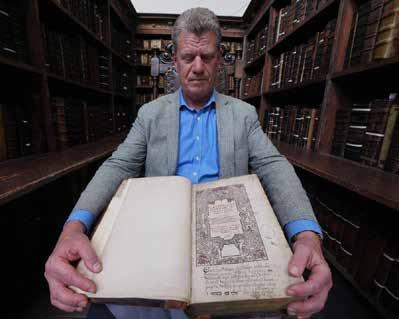
A copy of the first Bible that was printed in Welsh has gone on display at St Davids Cathedral.
The first edition of Y Beibl Cyssegr-Lan, dating from 1588, is on loan to the cathedral from Westminster Abbey, which was presented with the copy in the year of its publication.
Having been taken to St Davids for a conference of cathedral archivists last month, the historic volume is scheduled to stay on public display until 9 July.
The translation was made during the Reformation, the movement which insisted that the Bible should be made available in people’s everyday languages so that everyone could have access to its message.
‘Could Christianity be making a comeback among the young?’ asked columnist David Hepworth in Radio Times
Reflecting on the popularity of faith podcasts, David wrote: ‘What is apparent is that faith is once again an acceptable subject for discussion among thoughtful people under 40. Religious revivals being as old as time, it’s no surprise that this time, a lot of that discussion takes place in the digital realm.’
The article went on to highlight a podcast called The Surprising Rebirth of Belief in God, hosted by the author and broadcaster Justin Brierley.
‘The way he and his interviewees tell it,’ wrote David, ‘the current uptick in spiritual engagement began with a rejection of what they call “the new atheism”, which not long ago was selling a lot of books for the likes of Richard Dawkins.’
He added that, with new atheism no longer having ‘convincing answers’, curious people have begun to cast ‘nervous glances at what’s happening in the new faith sector’.
To mark the 20th anniversary of the 7 July London bombings, Major ESTELLE BLAKE, who was working at a Salvation Army centre in King’s Cross, reflects on the day – and how it affected her life
Interview by Ewan Hall
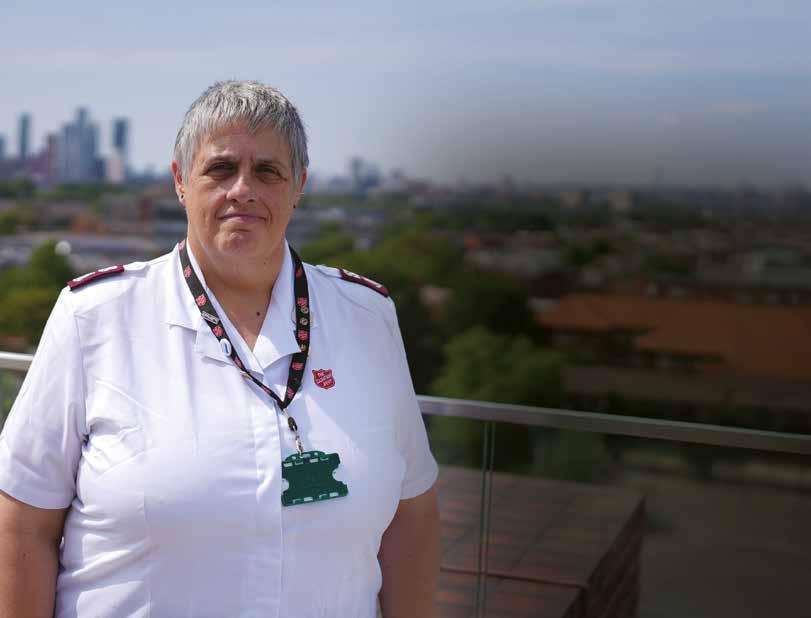

Twenty years ago, four suicide bombers carried out co-ordinated attacks in central London that resulted in the deaths of 52 people and injured more than 700. It is still the single worst terrorist attack to happen on British soil.
On 7 July 2005, London’s public transport system was targeted during the morning rush hour, with three of the bombs exploding within minutes of each other on Underground trains at Aldgate, Edgware Road and between King’s Cross and Russell Square stations. A fourth explosion followed on a doubledecker bus at Tavistock Square.
On that day, Major Estelle Blake was working at The Salvation Army’s Faith House, the hub of an outreach programme for sex workers and victims of human trafficking.
‘Faith House was directly opposite King’s Cross and St Pancras stations,’ Estelle explains. ‘When you were in the
Rescue crews are served refreshments from a Salvation Army emergency vehicle at Russell Square
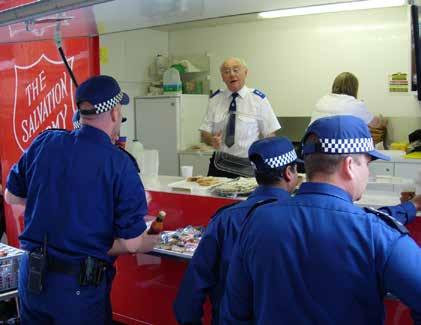
office you would feel and hear the Tube trains running underneath. On the day of the bombings, I was upstairs on the second floor, and I felt this weird rumble.
‘I put my head out the door and everything was chaotic. I changed into my Salvation Army uniform and, as I was going out the door, I heard an explosion. I thought there had been a big crash, but later I discovered it was the bus exploding.’
Estelle received a phone call from her Salvation Army bosses, alerting her to the attacks and instructing her to speak to the police.
When she located the police operation, she saw that they had cordoned off the affected area, which had caused confusion among the public, who weren’t sure where they should be going.
‘One of the police officers I spoke to was unsure where to send people,’ Estelle says. ‘I told him I was from The Salvation Army and asked what I could do to help. He said: “Do you live around here?” I told him I did, and he asked me to direct the members of the public. So, I stood on a step and started telling people that if they were going to the City, to walk one way, if they were going to the West End, to walk the other. I did that for half an hour.’
Then Estelle, with the help of a colleague, opened Faith House, so that police could make confidential calls on a landline as the mobile signal had gone down. Faith House also became a place where vulnerable people and those
whose health was deemed to be at risk were given shelter.
Estelle believes that over the following days the horror of the bombings brought the community around King’s Cross together. When The Salvation Army sent an emergency response vehicle to the scene to provide refreshments to the emergency services, shops helped to keep it stocked up with bottled water, coffee and tea. Hoteliers from the area also offered food.

Weary members of the public accept the offer of water at St Pancras
They needed somewhere quiet to sit away from the bomb scene
However, Estelle says that in the hours after the bombings, it was a nearby Burger King that provided immediate support.
‘The police went into the Burger King and asked them to open for food and to provide another place for emergency service staff to rest,’ Estelle explains. ‘I stayed in the Burger King and helped the staff in preparing food.’
The restaurant became an important venue for many people that day – and not just because of the food.
‘It wasn’t just the emergency services who needed it,’ Estelle recalls. ‘There were builders and construction workers who had been doing all the tunnel work for some station upgrades. They were the ones helping the police to get to
places underground. And those workers needed somewhere quiet to sit away from the bomb scene.’
Estelle provided all the help she could throughout the day, finally finishing at midnight. She and other members of The Salvation Army continued that support to the emergency services in the days and weeks afterwards.
As she reflects on the horror and chaos of the day, Estelle remembers one thing in particular.
‘The silence after the explosions,’ she says. ‘I have never known silence on Euston Road. And that was quite scary. There had been all this commotion and noise, and then Euston Road was quiet.’
As Estelle is an officer in The Salvation Army, faith plays a central role in her life. And the events of 7 July had an effect on what she believes.
‘My faith did change,’ she says. ‘That day reminded me of my mortality and that anything can happen at any minute. It made me question, am I right with God? I know I have to be closer to Jesus – and it made me want to make sure others know about him, as we never know when we may die. The day of the bombings made me want to be more open about my faith.’

As the Women’s Euro 2025 kicks off in Switzerland, footballer-turned-content creator CHARLOTTE LYNCH reflects on the development of the game since England’s victory three years ago, talks about appearing in a new TV series about a children’s team and explains what has kept her focused on more than football
Interview by Philip Halcrow
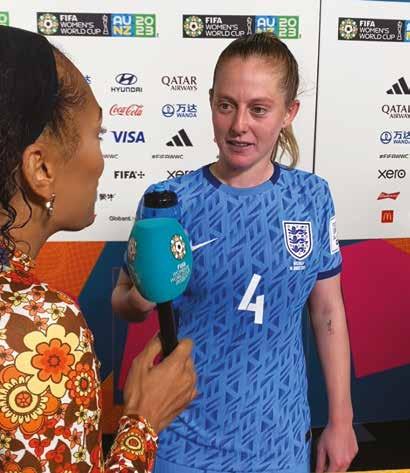

Charlotte Lynch

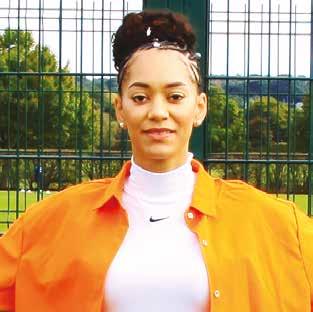
The crowds for England v Austria at Old Trafford, Switzerland v the Netherlands at Bramall Lane and Germany v France at Stadium MK were breaking Women’s Euros records when football came home three years ago. And when 87,192 watched England beat Germany in the tournament’s final at Wembley, it brought home to many people the reality of what was going on in the sport – a reality that, as a player and a digital content creator, Charlotte Lynch has been well positioned to see.
‘The Euros were a turning point,’ says Charlotte. ‘Girls could see what was possible. They saw that they could make a career out of football and that they could play at a high level.
‘With England’s win came more demand for the game. Now a lot more women and girls are either returning to the game or are starting to play.
‘There is so much more visibility for women’s football now. It’s on TV, it’s on posters, the kits are available in shops. And at grassroots there are so many more teams, there’s so much more opportunity. There are stronger rules about inclusion, so clubs and communities are having to think about what provisions they have for women and girls.
‘Go to your local park at the weekend and you’ll see girls’ teams playing. Go online and you’ll find content around women’s football.
‘There are still challenges, but I think we’ve come a long way.’
The strides taken by the game were highlighted for Charlotte a year after England’s win at the Women’s Euro 2022, when she reported for Fifa on the Women’s World Cup, interviewing fans and players and watching the games – including the final between England and






Spain in Sydney.
‘From a personal perspective, I found it amazing,’ she reflects. ‘The Women’s World Cup was hardly shown on the TV when I was growing up. I could never have imagined how the game would grow to become this big.’

Charlotte appears with former England international – and Euro 2022 winner – Jill Scott in the new CBeebies show ‘Football Fantastics’; (left) reporting from the Women’s World Cup
And as the Uefa Women’s Euro 2025 gets under way in Switzerland – with England and Wales among the nations competing – Charlotte will be playing her part in making the joys of football visible to younger children when she makes her acting debut alongside Euro 2022 winner Jill Scott in the CBeebies series Football Fantastics
‘It follows six kids – girls and boys – who come together every weekend and play for their local football group,’ says Charlotte. ‘They’re creating friendships, they’re going on adventures and they’re learning life lessons. I play Georgie, their coach, who cares for every kid that walks through the door.’
Charlotte’s personal experience of football goes back to her childhood in east London where – in terms of participation –she had challenges to overcome.
I was thinking: ‘I wish I could join in’
‘Playing football was easy, because it’s so cheap to just buy a ball, and I would play in the park with my family,’ she says. ‘Finding a team was not so easy.
‘We struggled to find a local grassroots girls’ team. Women’s football wasn’t what it is now – this was more than 20 years ago – and there wasn’t the internet to help you find out information.
Sundays, and Sundays for us growing up were always about church and family.’
The family were committed to their church in Hackney, where Charlotte’s grandfather was a pastor.
‘So finding a team for my brother was quite difficult.
‘But one day we were walking down the high street in Ilford when we saw a group from another church who were doing outreach. My mum got speaking to one of them and asked whether they had any football activities that her son could join. They said that, yeah, they played in a Saturday church league.
‘It sounded perfect. My brother was so excited.
‘We all went along to training, and I was watching on the sidelines and thinking: “I wish I could join in.” I told my mum, and she spoke to the coach. He had to find out

‘At the time, my family were looking for a team for my brother, because he was so talented. But all the teams used to play on

Turn to page 10 f
if it was OK for me to play, but once we got the go-ahead, I started training and eventually playing matches.
‘Being in a girls’ team wasn’t a possibility back then, so to be in a boys’ team – just to be in a team – was a dream come true.’
Charlotte says that when she was about 14 years old, she took a break from playing in a team, though she still played football ‘just casually in the park’. She returned to action when she went to university, and she enjoyed it so much that she decided to continue training with the team after she graduated. It was a move that proved pivotal.
‘It just so happened that there was a West Ham scout there,’ Charlotte remembers. ‘He saw me and asked me to go to West Ham and train with them.’
In Charlotte’s eyes, it was no fluke.
‘Just before that, I’d prayed a prayer. After my football experience at uni I was wondering if I could have made it. I wanted

to know if I was good enough to have gone on and tested myself against other good players.
‘So I prayed that prayer in my heart, and then soon after, the scout spotted me. And it’s funny because I wasn’t even supposed to be there – I was supposed to be getting on with finding a job and buying a house or whatever else you do when you leave uni.
‘But it was such a blessing that God worked it out that way.’
Charlotte joined West Ham and then went on to play for Islington Borough, Enfield Town, Millwall and Leyton Orient.
She is sure not only that her route into football was part of God’s plan for her, but also that he has guided her through highs and lows in the game.
‘Faith helped me in playing,’ she says. ‘Football can be all-consuming – it can dictate your mind, your body, what you’re eating, the time you go to bed. If you’re not careful, you can let it become your
whole identity. So my faith helped me stay grounded and focused. I have realised that, aside from football, I’m still a human being, I’m still valuable.
‘God has a plan for my life. And part of that plan, I believe, is football. But if football were to be taken away from me, I still have my identity.
‘I had a serious injury that took me out of the game for about six months. I was devastated. I was crying and felt really down. But my faith gave me perspective. My mum had a conversation with me and reminded me that my identity isn’t just in football.
‘That was when I really needed my faith. We’re born into the world as human beings – not as footballers or architects or whatever else. We’re human, and that is what makes us valuable.’
While the church in Ilford gave Charlotte her first opportunity to join a team, she also recalls how her experiences at the family’s regular place of worship in Hackney highlighted an aspect of her character that would later lead her to step into her role as a digital content creator and sports journalist.
‘Growing up, I always loved to ask questions,’ she says. ‘Especially being in church among people of all ages, all demographics, I found that I loved learning from other people’s lives.
‘Then I studied sports science, biomechanics and sport psychology at uni, which gave me a good foundation from which to ask questions on football.
‘I thought it was interesting when people started to cover grassroots matches and have their own YouTube channels. So one day I ordered a mike and started turning up at grassroots games and certain events –such as award shows – and began asking questions and creating my own content. I realised that I could combine my two passions of asking questions and football.’
Then Charlotte received a call-up to a major tournament.
‘Fifa contacted me on Instagram,’ she says. ‘It was mind-blowing – the creator of the World Cup called me up.
‘The whole tournament was just a dream. The fans showed up for their teams. A couple of hours before the games they’d be getting together and sharing their food – it was so wholesome to see all these nations coming together for football and to celebrate the game.
‘Then I’d move on to watch the matches and would be interviewing the players. The quality of the football was just on a different level – to see how fast the ball was moving.
‘Going to the World Cup just shows




what can happen if you take a risk and do what is in your heart, because you never know what may come of it.’
Charlotte has already recorded interviews with Lionesses for content that will be released during the Euros, and is looking forward to the tournament in the hope that it will be entertaining, will bring people together and will give ‘another big push’ to the idea that she promotes in much of her content: that ‘girls and women can enjoy playing as much as anyone else’.
But, as well as encouraging people online, Charlotte aims be a positive influence offline. It’s another aspect to her life that she tracks back to her early church experiences.
‘We were at the church in Hackney every week,’ she says. ‘And our faith wasn’t something we just talked about. We tried to live by it. We did a lot of outreach in the community, and it shaped me from a young
age in that I thought beyond myself and my own needs. Our way of thinking was to ask: How can we help others? How can we make the world a better place?
We’d give young people a safe space to hang out
‘Wdifference to communities, Charlotte helps out at tournaments run by Christian outreach organisation Football Ambassadors. ‘I take girls from all kinds of backgrounds – they play in the tournament and they get to meet Christians and hear their stories, which is beautiful,’ she says.
She also hopes that the new CBeebies series Football Fantastics will leave a legacy.
‘It’s great to know that children will be watching and will be encouraged to get involved in football,’ she says.
‘I’ve made lifelong friendships through football. They’re people I can talk to when I’m going through a tough time or celebrate with when I’ve achieved something.

e started a youth group. Every Friday night we’d open up the church building and give young people from the area a safe space to hang out. There would be games and guest speakers, and I still remember setting up the chairs and making the hot dogs. It was just such a wholesome time. It was giving young people a space away from some of the other things they could be getting involved in which weren’t so productive.’ Still wanting to make a positive

‘I still remember the programmes I watched growing up and how they impacted me. So being part of something that can inspire children to find community and learn life lessons feels such a blessing.’
Your prayers are requested for Mary, that her heart will beat normally.
The War Cry invites readers to send in requests for prayer, including the first names of individuals and details of their circumstances, for publication. Send your Prayerlink requests to warcry@salvationarmy.org.uk or to War Cry, 1 Champion Park, London SE5 8FJ. Mark your correspondence ‘Confidential’.
There is no set formula to becoming a Christian, but many people have found saying this prayer to be a helpful first step to a relationship with God
Jeremiah prophesied from the days of Judah’s King Josiah until after Judah was taken into Babylonian captivity.
As recorded in 2 Kings, Judah is under increasing attack from Babylon. Jeremiah has the unenviable task of warning of impending national disaster and then seeing it come to pass. A true prophet of doom, his name is synonymous with pessimism.
Judah’s downfall, says God through Jeremiah, is due to her unfaithfulness, idolatry, ignoring of his warnings and refusal to repent. Actions have consequences; punishment will follow (chapters 2 to 15). Unless the people of Judah repent, they will be held captive in a foreign land again (chapter 16).
A breaking of the relationship with God on a national or communal scale is not the only factor for the growing crisis; there is personal responsibility. ‘Everyone,’ says Jeremiah, ‘will die for their own sin’ (31:30).
Lord Jesus Christ,
I know that I have done things in my life that are wrong and I’m sorry. Thank you that I can ask you for forgiveness because of the sacrifice you made when you died on the cross.

Please forgive me and help me to live a better life in the future as I learn how to love you and follow your way of living.
Thank you, Lord Jesus.
If you’ve prayed this prayer, scan the QR code or contact us using the coupon on this page

While other prophets insist that Babylon will not invade, Jeremiah warns that national hope lies in not resisting, saying: ‘Whoever stays in this city will die by the sword, famine or plague, but whoever goes over to the Babylonians will live. They will escape with their lives’ (38:2).
For such treasonous advice, he is incarcerated in an underground water tank and left to die. He is, though, rescued and witnesses the fall of Jerusalem (chapters 38 and 39). While being removed to Babylon, he is released and is eventually taken to Egypt (43:6 and 7).
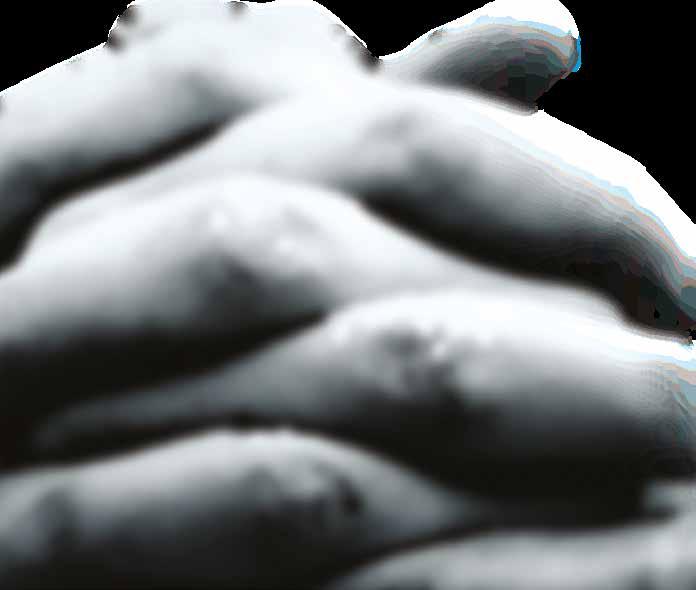
While Jeremiah majors on punishment for sin, he also offers glimpses of the possibility of salvation. Nationhood, he insists, will be restored. God will raise a new king – a ‘righteous Branch’ (23:5). Babylonian captivity will be limited to 70 years, after which God will punish Babylon (chapter 25), and Judah and Israel will return and be restored (chapters 30 and 31). A new covenant will be made – God’s law will be written on people’s hearts (31:31–34). God ‘will forgive their wickedness and will remember their sins no more’ (31:34) and bring ‘health and healing’ (33:6).
With Jerusalem besieged and Judah on the brink of annihilation, Jeremiah puts his money where his mouth is. He buys a field from an uncle, believing God’s promise that one day Judah would repopulate the land (chapter 32).

To receive basic reading about Christianity and information about The Salvation Army, complete this coupon and send it to


1 2 3 4 5 6
Which girl group had a No 1 single in 1996 with ‘Say You’ll Be There’?
Who is the author of the bestselling thriller novel Here One Moment?
How many elements are in the periodic table?
Who is the current host of Radio 4’s Desert Island Discs?
Denzel Washington played power broker Macrinus in which film released last year?
What is the national speed limit for cars on single carriageway roads?

Feature by Ewan Hall
It’stime for road cycling fans to break away from any distractions. Today (Saturday 5 July) the riders are setting off from Lille on the Tour de France – and between now and the finishing line in Paris on 27 July, they will tackle a gruelling variety of flat routes, mountain climbs and time trials.
The race includes several competitions, such as the one for the polka dot jersey, which is awarded to the best climber. However, it’s the yellow jersey, worn by the overall race leader, that riders are chasing the most. Last year, it was ultimately won by Tadej Pogacar, who is returning to defend his title against two-time winner Jonas Vingegaard and tens of other riders.
This year’s route features six mountain stages, and two of them in particular – Mont Ventoux and Col de la Loze – are expected to play a role in deciding the race winner. The ascent of Mont Ventoux presents both a psychological and physical test, with unpredictable winds potentially hindering the riders’ climb. The Col de la Loze features the highest point of the race and the most difficult gradients.
Cyclists or not, it’s likely we all know what it means for something to feel like an uphill struggle. Some days, life seems to be going smoothly, but on other days it can be tough. Work can present us with demanding deadlines. Financial difficulties can mount up. Time pressures can put our relationships under strain.
But we needn’t face such trials alone, because God is always ready to guide us and give us his strength.
It’s a truth that many people have relied on over time.
One Bible passage includes the personal reflections of someone seeking strength for a physical journey towards a goal and concluding: ‘I lift up my eyes to the mountains – where does my help come from? My help comes from the Lord’ (Psalm 121:1 and 2 New International Version).
No matter what lies ahead for us, we can know that God is by our side. If we put our trust in him, we can discover a source of strength that will help us through every stage of life.

ACROSS
1. Merit (7)
5. Roman god of love (5)
7. Flaw (7)
8. Opponent (5) 10. Wicked (4)
11. Withstood (8) 13. Murdered (6)
14. Stratagem (6)
17. Correct (8) 19. Group of three musicians (4) 21. Tendency (5) 22. Passionate (7) 23. Requested (5)
Furtiveness (7)
2. Exceptional (7) 3. Destroy (4)
Resounded (6) 5. Woollen jacket (8) 6. Central point (5)
First meal (9)
Absurd (9)



Each solution starts on the coloured cell and reads clockwise round the number HONEYC O M B

Look up, down, forwards, backwards and diagonally on the grid to find these songs of the ’00s


METHOD
For the pastry
250g plain flour
125g butter
5g salt
For the filling
3 eggs
125ml milk
125ml double cream
5g salt
5g pepper
150g peas
150g broad

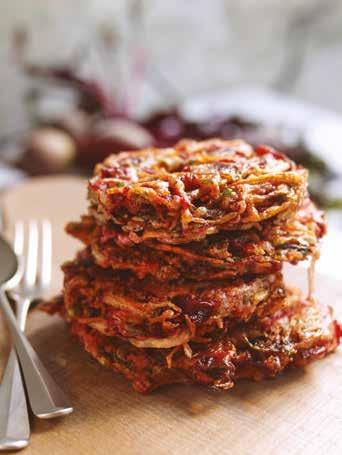
INGREDIENTS
200g gram flour
Salt and pepper
200g raw beetroot, peeled and grated
200g carrot, peeled and grated
1 bunch spring onions, finely chopped 2tbsp vegetable oil

To make the pastry, combine the flour and butter in a bowl and rub together until the mixture resembles fine breadcrumbs, then add the salt.
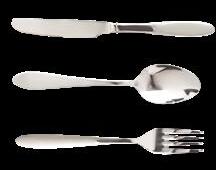


Gradually pour water into the bowl and knead to form a dough, but be careful not to work it too much, otherwise the pastry will turn out hard. Cover the bowl and leave to rest in the fridge for 30 minutes.
Roll out the pastry so that it is 2mm thick and use an 8cm cutter to cut out 12 rounds. Place the rounds in the holes of a muffin tray, pressing down firmly.
Preheat the oven to 160C/Gas Mark 3.
For the filling, break the eggs into a bowl and whisk together with the milk and cream. Season with salt and pepper, then set aside.
Divide the remaining filling ingredients evenly between all the pastry cases, then pour in the egg mixture.
Bake in the oven for 20 minutes, until the filling is set and the pastry is crisp, then serve.
METHOD
Preheat the oven to 180C/ Gas Mark 4.
Combine the flour, salt and pepper in a bowl with the beetroot, carrot and spring onion. Pour in enough water to bind the ingredients together, then mix well.
Heat the oil in a large frying pan over a medium heat. Once the pan is hot, divide the mixture into 4 portions and place each fritter in the pan. Fry for 2-3 minutes, until the bottom sets and starts to go crisp. Carefully flip the fritters and cook for a further 2-3 minutes on the other side.

Transfer to a baking sheet and cook in the oven for 10 minutes, until the centre of each fritter is cooked through. Remove from the oven and serve.

Psalm 34:18 (English Standard Version)